iPhone 12 vs iPhone 12 Pro
We may earn a commission if you make a purchase from the links on this page.
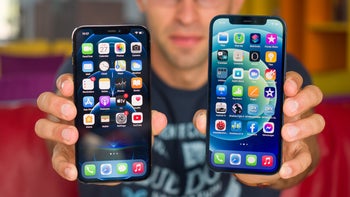
The iPhone 12 series are now official! The iPhone 12 and iPhone 12 Pro promise amazing performance with the new A14 Bionic chip, and 5G capabilities, turning the iPhone 12 series into very fast and capable phones. Additionally, further future-proof, as 5G technology is still not that developed. The standard iPhone 12 and the iPhone 12 Pro have certain similarities, but they also have important differences, so here we compare the official information about the upcoming two smartphones.
- Buy iPhone 12 at Best Buy (Verizon | AT&T | T-Mobile)
- Buy iPhone 12 Pro at Best Buy (Verizon | AT&T | T-Mobile)
Also read:
- iPhone 12 Pro Review
- iPhone 12 Review
- iPhone 12 mini vs iPhone SE (2020)
- iPhone 12/mini vs iPhone 11
- iPhone 12 vs Samsung Galaxy S20 FE
iPhone 12 vs iPhone 12 Pro design and colors
The iPhone 12 and the iPhone 12 Pro both have the same classic, iPhone 4-inspired design with flat sides; however, this time the phones have thinner bezels, compared to last year's iPhone 11 series, along with overall thinner and lighter body. A notch houses the front selfie camera and the Face ID sensor. The Apple logo is positioned in the center of the iPhone 12’s back. Both phones feature 6.1-inch displays and are therefore of very similar size. Both phones feel solid in your grip, although the flat sides may not be the most comfortable to hold.
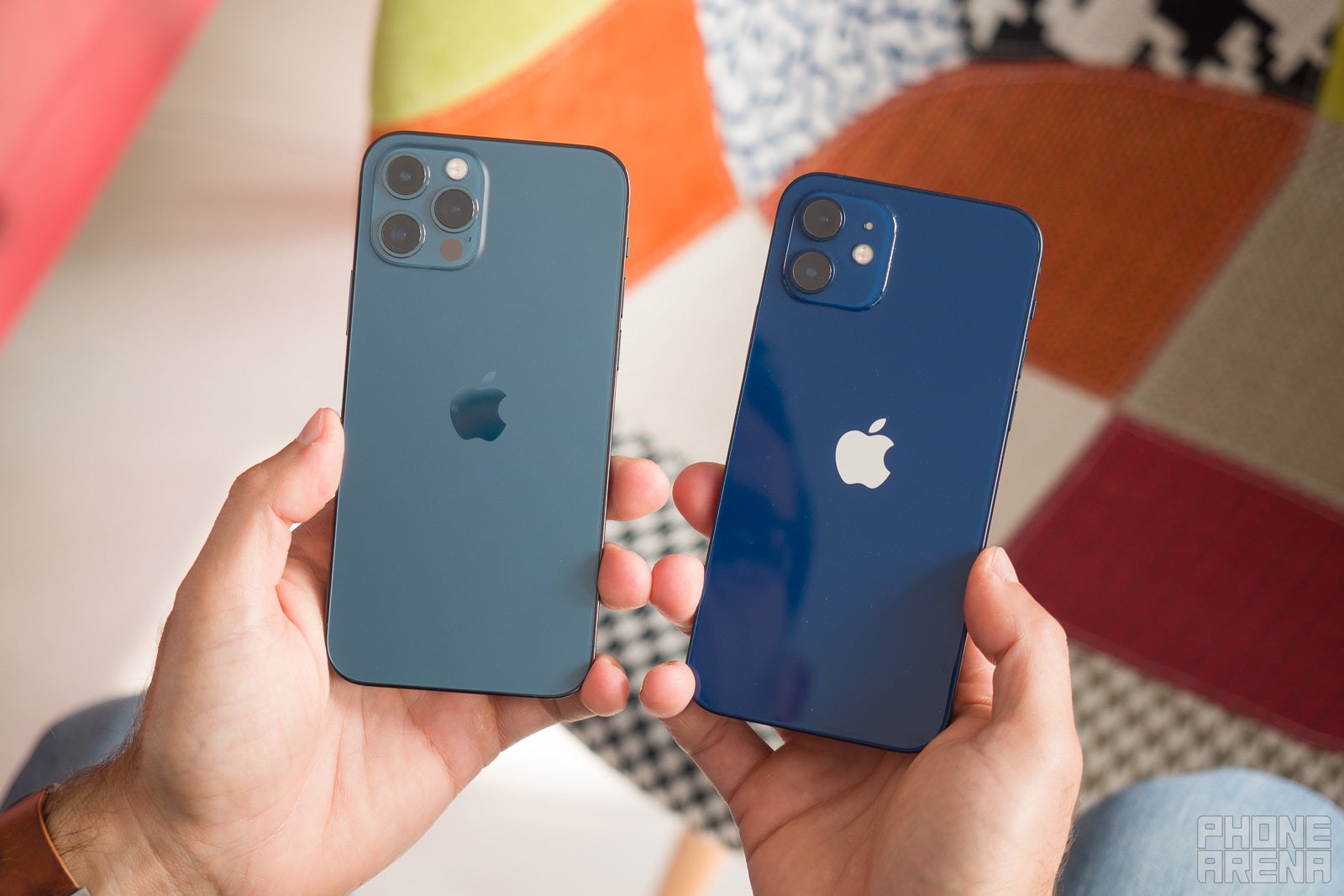
The iPhone 12 Blue is slightly darker blue color than the iPhone 12 Pro
Here are the iPhone 12 colors:
- White
- Black
- Blue
- Red
- Green
- New color: purple
Read more in detail about the iPhone 12 colors here.
UPDATE: If you're interested in the new color for the iPhone 12, purple, check out our article: Purple iPhone 12 is now up for pre-order!
Here are the iPhone 12 Pro colors:
- Pacific Blue
- Silver
- Graphite
- Gold
Read more in detail about the iPhone 12 Pro colors here.
Both smartphones come with glass backs, but while the iPhone 12 sports a slightly cheaper, matte aluminum frame, the 12 Pro upgrades that to a finely polished stainless steel one. It has a glossy finish, so it might as well attract more fingerprints than the aluminum on the iPhone 12’s frame. Additionally, the iPhone 12 and 12 Pro come protected from water and dust with an IP68 rating.
Another quite curious aspect of the new design is the small plastic section on the side of the iPhone 12 and 12 Pro. It is for the mmWave antenna, required so that the phones will work on Verizon’s 5G mmWave network.
Another quite curious aspect of the new design is the small plastic section on the side of the iPhone 12 and 12 Pro. It is for the mmWave antenna, required so that the phones will work on Verizon’s 5G mmWave network.
Also read:
- iPhone 12 and iPhone 12 mini colors: which iPhone 12 color should you get?
- iPhone 12 Pro and Pro Max colors: which iPhone 12 Pro color should you get?
More durable with Ceramic Shield for iPhone 12 and 12 Pro
The iPhone 12 and 12 Pro will come protected by a Ceramic Shield layer, which, Apple says, brings 4x more protection in accidental drops. It's good that even the more cheaper model is getting this reliability feature. This is potentially very useful as it seems the display repairs costs for the iPhone 12 series have gone up.
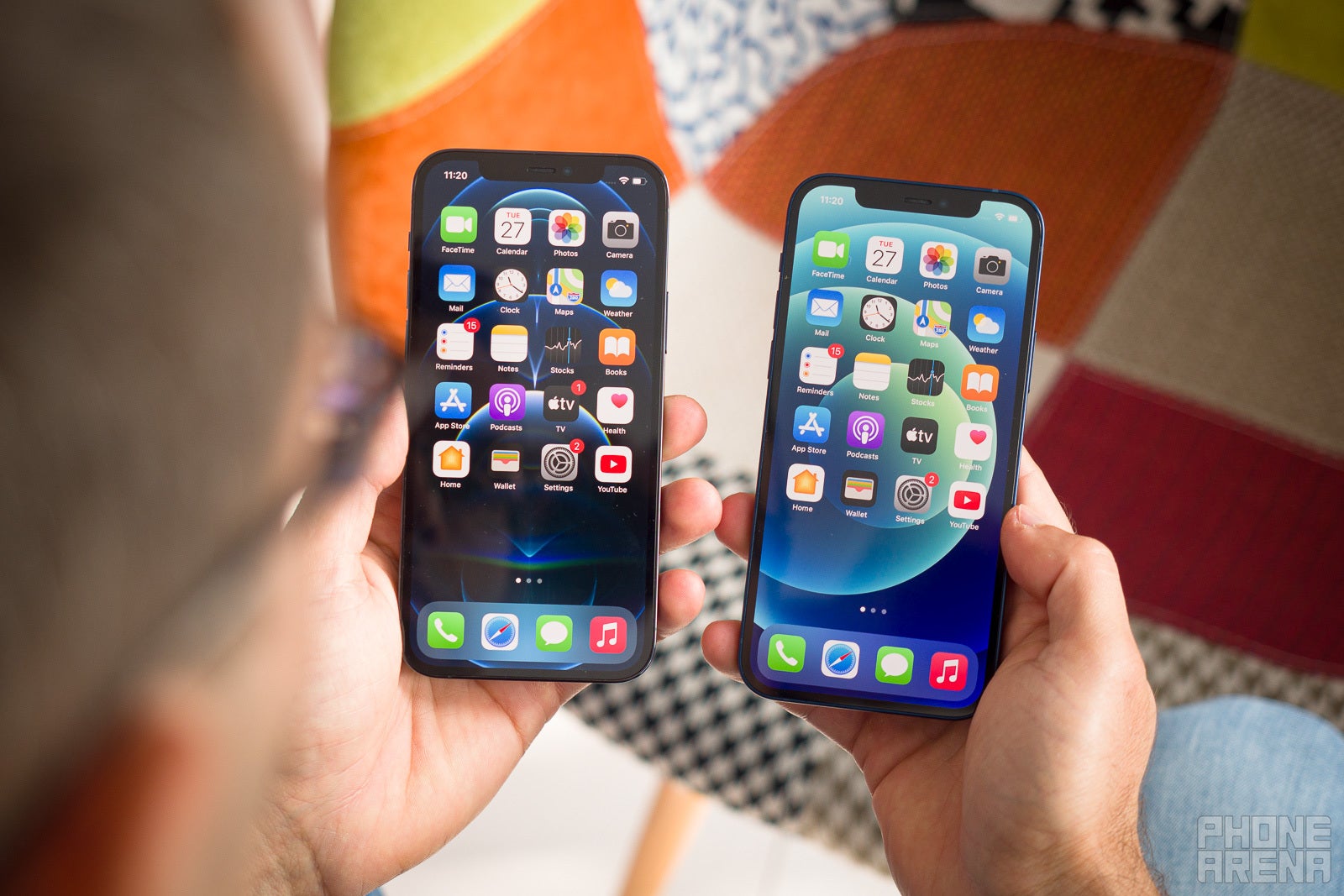
iPhone 12 vs iPhone 12 Pro display
The displays on the iPhone 12 6.1-inch and the iPhone 12 Pro are pretty much the same: a beautiful 6.1-inch Super Retina XDR OLED is present on both phones, with 2532 x 1170 pixels resolution and 458 PPI, for a crystal-clear and crisp image. This might seem like a surprise to some, as in previous years, non-Pro iPhones featured an LCD display instead of an OLED which was reserved for the Pro models. A welcome and highly appreciated update, we might add.
The only difference when exploring the tech specs of the two phones with regards to the displays, is that the typical max brightness of the iPhone 12 is listed as 625 nits, while the one of the iPhone 12 Pro is 800 nits, so the 12 Pro might enjoy a bit of an edge in sunny outdoor locations. Their peak brightness appears to be 1200 nits for both.
There are no compromises in color accuracy, contrast and brightness, although the white balance on the iPhone 12 may appear a little bit yellowish.
There are no compromises in color accuracy, contrast and brightness, although the white balance on the iPhone 12 may appear a little bit yellowish.
iPhone 12 vs iPhone 12 Pro hardware and performance
- A14 Bionic chip
- 64 vs 128 GB base storage options
Here, the differences are, again, almost non-existent. Both phones are powered by the almighty A14 Bionic chip, built upon a 5nm manufacturing process, tipped by Apple to be better performing than the powerful A13 that we find in the previous generation of iPhones. Apple states the A14 is the fastest processor on a smartphone, and also very power-efficient at the same time. By far the biggest difference between the two phones in this section is the base storage level. For the iPhone 12, this is 64 GB ($799 price), but for the iPhone 12 Pro, it's 128 GB ($999).
The A14 chip performs flawlessly on both phones, making them snappy and quick for years to come.
The A14 chip performs flawlessly on both phones, making them snappy and quick for years to come.
iOS 14 brought us some interesting touches with Picture-in-Picture and widgets, making the iOS experience a more customizable and multitasking-friendly one. The 6.1-inch screen on both devices will additionally help to multitask, and with this mighty processor, we expect no compromises on performance.
- iOS 14 review: all the new features
- How to use the new iOS 14 widgets
- How to customize icons in iOS 14
iPhone 12 vs iPhone 12 Pro cameras
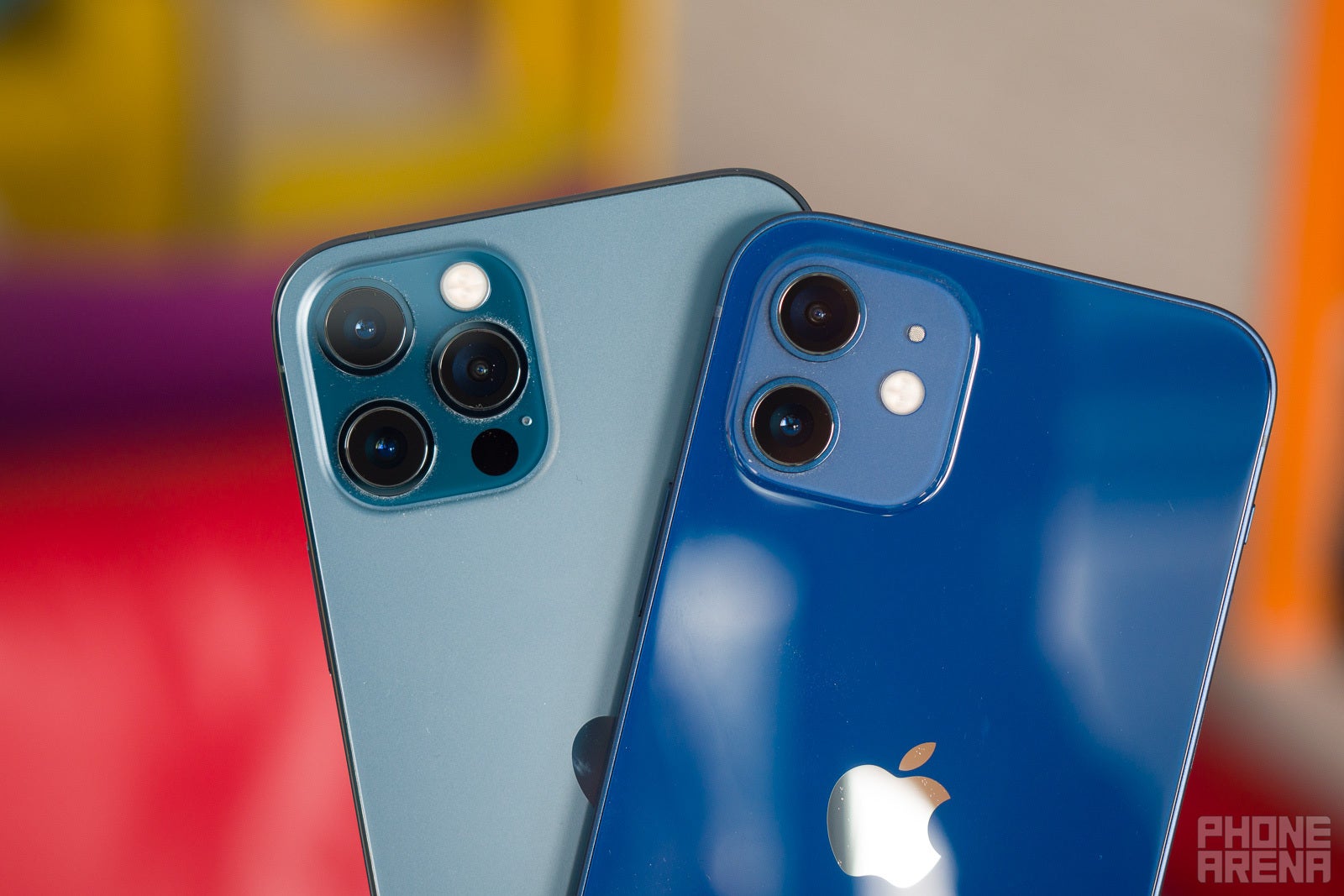
The iPhone 12 has a dual camera system, iPhone 12 Pro a triple one
We find the biggest difference between the two models in the camera department. The iPhone 12 features a dual-camera system on its back, with a main sensor of 12MP, featuring a 7-element lens which brings in 27% more information in low-light conditions.
On the other hand, the iPhone 12 Pro has four cameras, beating the standard iPhone 12 with a telephoto camera, and a LiDAR sensor, which assures a more realistic-looking AR, Portrait mode in low-light, faster shutter speeds and autofocus for Night Mode.
But it's not only the hardware helping the iPhone 12 Pro stand out. Now, iPhone 12 Pro brings RAW format for photos, which allows more editing control. However, Apple is particularly proud of combining the new RAW format (it's called Apple ProRAW) with all the goodies that come with its advanced computational photography processing. Obviously the A14 chipset is credited as being the key enabler here. This RAW camera format is not available on the iPhone 12, which is understandable, considering the Pro series is promoted as the iPhones for photographers this year.
The iPhone 12 Pro also impresses with its improved OIS capability. Powered by the LiDAR sensor, the iPhone 12 Pro's cameras will be capable of quickly focusing on a subject in low light conditions, providing extensive depth information.
Both models support regular and HDR 4K recording at 60 fps.
iPhone 12 vs iPhone 12 Pro Photo Quality
Now, let's look at some samples, shall we? On the first look, photos from both the iPhone 12 and the iPhone 12 Pro look stunning, with beautiful color accuracy and dynamic range. Photos look great with a good level of detail even in challenging situations:
Colors look vibrant and full of life. One aspect in which the iPhone 12 Pro is better is the zoom category, where its 5x zoom photo looks more detailed and realistic than the one taken on the iPhone 12. However, when you go up to 10x zoom, we can clearly see the photo quality suffer even on the Pro model.
Portrait shots are almost indistinguishable between the iPhone 12 and the iPhone 12 Pro in regards to photo quality, color accuracy, dynamic range, and details. If you don’t know which one is which, it will be quite hard to tell them apart. One advantage here is that on the iPhone 12 Pro you can use the telephoto lens to take a close-up portrait, a nice feature that you don’t have on the iPhone 12.
Selfies on both iPhones look equally great, detailed and realistic. The portrait mode on both iPhones in selfies also does a pretty good job. However, if we really look in harder on those shots, we can see that the iPhone 12 Pro seems to have done a slightly better job on isolation the subject's hair from the background.
The nighttime samples paint quite a similar picture as well.
Both phones do quite good with the challenging shots, rendering great level of detail and balanced colors for the night shots. We can see a bit more detail in the leaves on the samples taken with the iPhone 12 Pro, but this difference is barely noticeable on these photos.
In these shots, all the detail, colors, and dynamics are rendered great with both phones.
As for the night portrait shots, we are also pretty satisfied with both the iPhone 12 and the iPhone 12 Pro shots:
We see the image the iPhone 12 Pro produced is a bit more bright and clear, with more detail on the subject.
For more sample photos and detail, read our full iPhone 12 review and our iPhone 12 Pro review.
5G connectivity
The iPhone 12 series are the first iPhones to feature 5G connectivity, so iPhone users will now be able to benefit from lower-latency and higher network speeds that 5G provides in areas where it is available. It’s important to note that, at the moment the 5G network in the US is not perfect and sometimes the connections will drop down to 4G LTE in areas with lower-coverage, so don’t expect to be able to instantly feel the difference that 5G will bring when you’re traveling around the states or even in cities.
Apple has additionally ensured that the iOS framework and apps have been optimized to take advantage of the faster 5G network speeds. To save battery life, the iPhone 12 and 12 Pro also have Smart Data mode, which ensures you're using 5G when you need it; and if you don't need it, automatically switches to LTE.
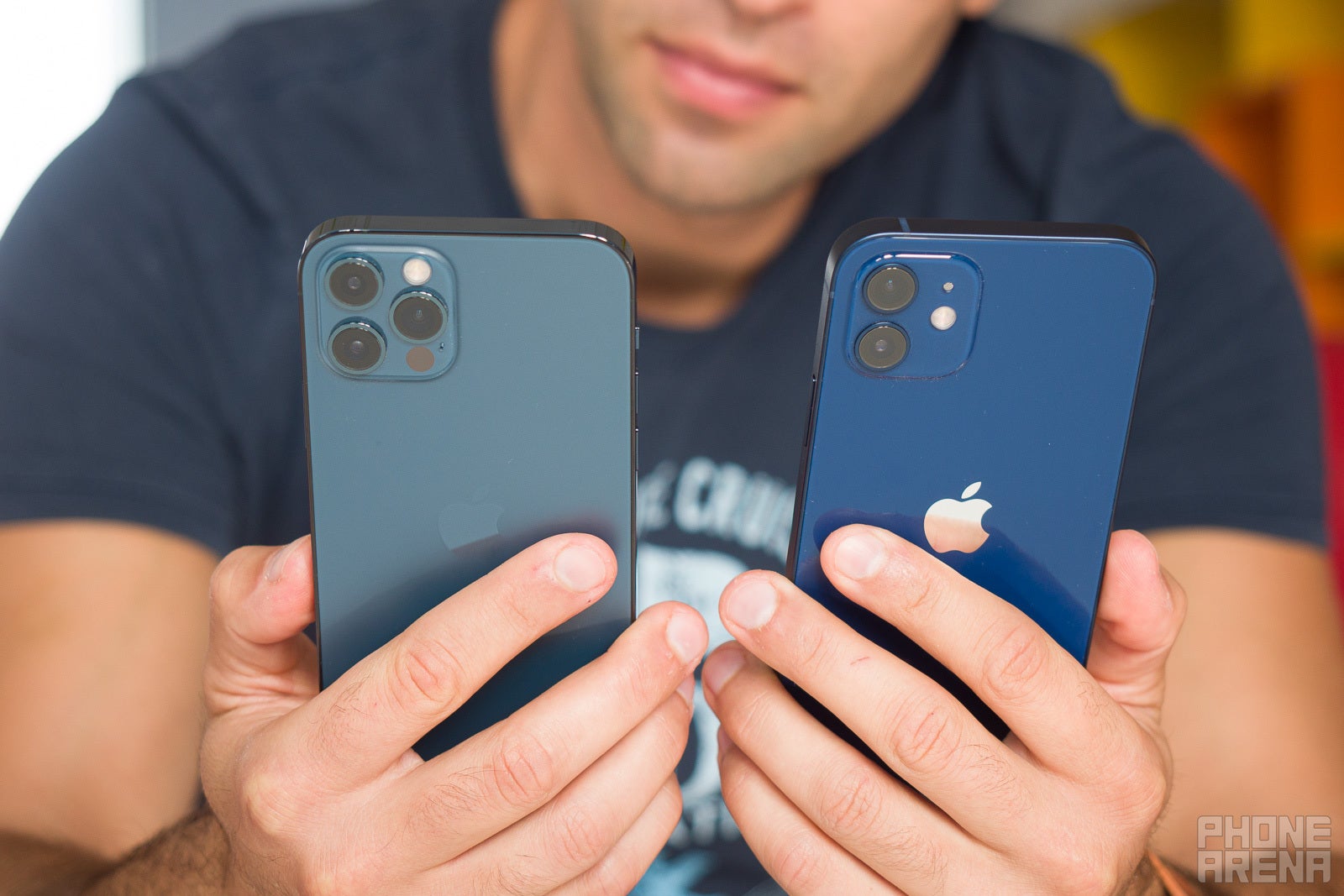
iPhone 12 vs iPhone 12 Pro battery life
- 2,775mAh
The battery-demanding 5G connectivity, big and beautiful OLED screens, and mighty performance capabilities flagship phones impress us with make a bigger battery a must in a flagship smartphone.
Well, no 120Hz display refresh rate this year on the iPhones, meaning it won’t impact their battery life. Additionally, the new A14 Bionic chip is built upon a 5nm manufacturing process, making it more power-efficient. However, it’s quite expected that the 5G network will drain the battery, even if the difference is minuscule thanks to that Smart Data mode.
Read also:
The iPhone 12 features a 2,775mAh battery cell, which is the same as the one on the iPhone 12 Pro. We have tested the iPhone 12 and the iPhone 12 Pro with our extensive battery tests, and here are the results:
See here how other phones perform: iPhone 12 Pro battery life test complete: bad news for gamers!
We can see that both the iPhone 12 and 12 Pro's batteries perform similarly in browsing, YouTube playback, and gaming. Unfortunately, both phones struggle a lot with maintaining good battery life for gaming, scoring only 3h, which is way below average.
iPhone 12 vs iPhone 12 Pro MagSafe
MagSafe is a new feature that both the iPhone 12 and iPhone 12 Pro support. It improves the reliability and efficiency of wireless charging, and features magnets that help with new iPhone 12 cases. Apple states that those magnets will help make the case installation an easier process, and we are eager to see what third-party manufacturers can come up with based on this new technology. The MagSafe accessories range from wireless chargers and wallets to car mounts, cases, and many more are expected to benefit from it.
Also read: Meet MagSafe for iPhone
iPhone 12 vs iPhone 12 Pro price and availability
- iPhone 12, price $799 on major carriers, $829 SIM-free, pre-orders start on October 16, 2020; official release date: October 23, 2020
- iPhone 12 Pro, price $999, pre-orders start on October 16, 2020; official release date: October 23, 2020












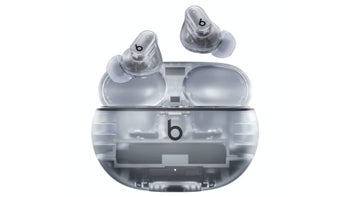






Things that are NOT allowed: